The Lilith Blog
December 21, 2020 by Helene Meyers
7 Jewish Feminist Highlights of 2020
Let’s face it—2020 has been a clusterf**k of a year, and I can’t wait to see it recede in the distance of my rearview mirror. While most Jews have observed Passover, the High Holidays, and Chanukah virtually, the national COVID fallout from Thanksgiving, Christmas, and New Year’s is likely to be heartbreaking, even more so given that a vaccine for most of us is just months away. The murders of George Floyd and Breonna Taylor tragically reminded us that we must continue to fight to make the truth that Black Lives Matter self-evident. And among the many, many hits that democracy took this year was the ramrodding of Amy Coney Barrett into the Supreme Court seat that Ruth Bader Ginsburg honorably and notoriously held from 1993 until her death on erev Rosh Hashanah.
- No Comments
December 17, 2020 by admin
Say What You Mean: Merry Christmas
When I was a kid, our house was pitch black in a sea of red and green lights. Lit up reindeer and plastic santas greeted me from the neighbors’ yards. It was beautiful. I wished we could have the same decorations.
One year, I decided my parents really could benefit from the belief in Santa. And even though Santa didn’t even visit our Jewish home- erroneous!- I hatched a plan. I took a small plastic cat from my collection of toys and went over to my parents in the kitchen.
- 1 Comment
December 16, 2020 by admin
This Hanukkah, Illuminating the Power of Feminists
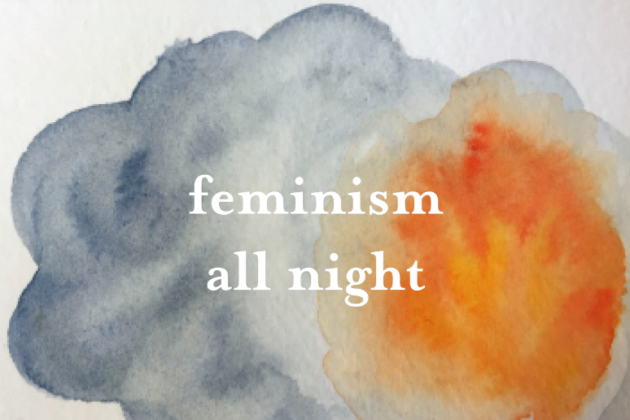
Four years ago, I sat in a communal Shavuot learning program. I recall thinking to myself, what is the Torah that the Jewish people need right now? The answer became crystal clear: it is feminism.
The next year, I decided to experiment and organize an event called Feminism All Night. The vision was inspired by the Jewish holiday of Shavuot and brought feminist thinkers together to teach and learn communally about feminism. The success was overwhelming, with over 100+ attendees and over 12 sessions that had us staying until 4 AM.
Since then, I have been cultivating this project by designing immersive feminist communal learning experiences centered on Jewish holidays. We hosted Feminism All Day for the holiday of Sukkot and expanded our events from Oakland to various cities, including Boston and Tel Aviv. Our community has grown to over 1500 people!
This year we decided to bring our vision of feminist Jewish learning to Chanukah. On the 7th Night of Chanukah on Rosh Chodesh Tevet is the traditional celebration of Chag haBanot (Eid al-Banat in Arabic), a North African Jewish Festival of the Daughters. The holiday elevates women’s power–the strength, wisdom and resilience of women throughout the ages. Women, young and elderly, would gather for a celebration together to delight in sweets, sing prayers, dance, and give gifts to each other, particularly gold coins and jewelry.
The holiday is associated with legendary and midrashic traditions or literary and historical traditions, about bold, wise, courageous and determined women who saved their people with their resourcefulness, wisdom, courageous hearts and heroism, and changed historical circumstances in antiquity.
Chag haBanot elevates the heroism and resourcefulness of brave, bold and wise women, such as Queen Esther, Judith daughter of Merari, or Hannah [sometimes Miriam], daughter of Matityahu. In times of danger to their people, they gathered courage, devotion, strength and resourcefulness, and acted in extraordinary ways that are recorded in the chronicles and told by the women on The Festival of the Daughters.
Feminism All Night is committed to creating space for feminist learning and particularly uplifting Mizrahi traditions in the Jewish world. Our programming has centered Mizrahi feminist educators from the beginning. We love celebrating the sacred traditions and teachings of Mizrahi communities and bringing them forth to the wider community.
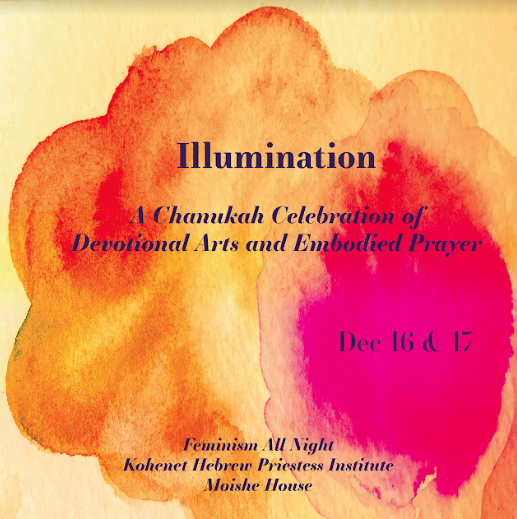
This year, on December 16th and 17th, we are hosting Illumination: A Chanukah Celebration of Devotional Arts and Embodied Prayer. Illumination is a collaboration between Hadar Cohen and Taya Mâ Shere. It is a partnership with Kohenet Hebrew Priestess Institute and is supported by Moishe House. The festival includes prayer, workshops and celebration. In honor of this celebration, we are featuring North African Jewish feminists–artists, teachers and spiritual leaders–on our Facebook and Instagram pages. Our programs are open to people of all genders and faiths and we invite you to join us–register here!
Some of our featured feminists include:
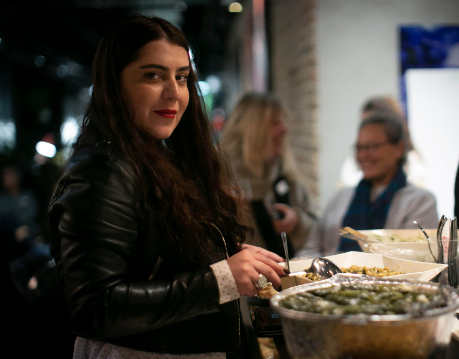
Sivan Tahel, a Moroccan activist and leader who was a lead organizer of Feminism All Night in Tel Aviv, January 2020, centered on Mizrahi Identity.
“Feminism is the mother of all struggles and everything connects to it. Feminism for me is solidarity, support networks of women, empowerment that is expressed in action, advancing other women and caring for their well-being, emotionally and financially. It is the ability to hear and listen to various strands of feminism, while respecting and embracing the diversity within the group of women. Feminism is the expansion of the feminist struggle with reference to power structures, ethnicity and status.”
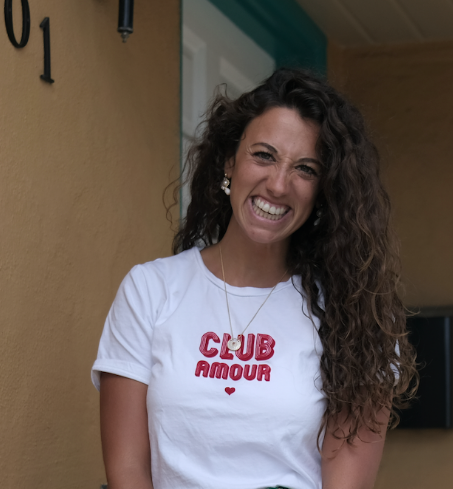
Nellie Alimi, a Tunisian and Algerian French artist who is working to preserve the North African rituals and traditions that she grew up with. Her family celebrated Eid Al Banat, and she will be sharing more about her familial lineage celebration at our Artistic Showcase.
“Feminism for me, is about elevating other women, showing a different type of leadership, embracing our own selves, not trying to fit into the white male model, speaking out truth, educating the world about strong women leaders and their challenges.”
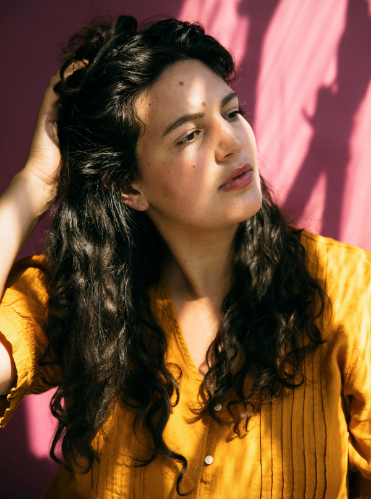
Daniela Labi, a Libyan feminist artist and community organizer. Daniela was one of the lead organizers for Feminism All Day 2019 in the Bay Area.
“To me, feminism means celebrating the true feminine power that lies within all of us. Feminism is the act of re-calibrating society so that we honor this power, lift it up, and use it to return to true alignment with g!d, the earth, and the universe. My mother was born and raised in Tripoli, Libya. She fled with her family in 1967, during the Six Day War, just months before she would’ve entered her last year of high school. For years, my ancestors lived in the deserts of Libya, and I feel the divine responsibility to capture their stories so that they are not lost to eurocentrism and whiteness.”
Hadar Cohen is a multimedia artist, educator and healer. She is the founder of Feminism All Night. To learn more about her work visit hadarcohen.me.
- No Comments
December 15, 2020 by Sharrona Pearl
Dr. Jill Biden Earned Her Title
Let’s get the facts out of the way first. Dr. Jill Biden earned her doctorate from the University of Delaware as a woman in her 50s, returning to study after raising a family. Joseph Epstein did not earn a doctorate in his 50s, 40s, or any other decade. In a recent – and misogynist, racist, and deeply offensive— editorial in The Wall Street Journal that has already generated a huge amount of pushback from academics both online and off, Epstein calls on Dr. Biden to stop using her title as an honorific.
- 1 Comment
December 15, 2020 by Polina Kroik
The Sufgania That Made Me Feel At Home In a Place That Rarely Felt Like One
In pre-pandemic years, when Hanukkah drew close, I’d find myself wandering the streets of New York in search of the perfect sufgania. I’d walk down to Breads Bakery in Union Square and order one of each kind, jelly-filled, plain, chocolate covered, then furtively bite into them on the way to the subway. The next day I’d travel all the way to the Lower East Side and get half a dozen, neatly arranged in a white cardboard box. This time I’d patiently wait until I got home, and slowly consume one in my overheated kitchen, hoping perhaps that the familiar setting would also infuse the fried pastry with a taste of the past.
- No Comments
December 14, 2020 by admin
Let it Be Dark. Rest Your Eyes.
Welcome to Kislev, for people in the Northern Hemisphere, a time for dreaming in the dark. We have lived through a long, difficult year, a year of intense challenges and overwhelming losses. We are exhausted, and all too aware of how much remains to be done. It can be hard to put our attention on the wins.
- No Comments
December 9, 2020 by Amy Stone
“The Occupation is a Worse Virus,” and More from The Other Israel Film Festival

New York has more than enough Jewish gathering points, so what’s lost and what, if anything, is gained when the city’s 14th annual Other Israel Film Festival from the Marlene Meyerson JCC goes virtual?
The main advantage is the joy of being able to stream the festival, which ends Dec. 11, throughout the US. It’s not too late to binge the festival’s features, documentaries, shorts at https://www.otherisrael.org/ The festival Q&As with filmmakers are numerous and streamed post-event. Select breakout sessions with other viewers are a virtual substitute for those film discussions on line outside the ladies room. (Remember those days?)
And there’s the intrusive intimacy of Zoom – is that Carole Zabar partially hidden by pillows during a Q&A question? Long time filmmaker Lilly Rivlin’s brown cardigan is hanging from the knob of a partially opened closet door behind her. A bedroom is at least a break from cable commentators’ living room bookshelves.
Carole Zabar’s founding vision was a film festival showing the “Other Israel” – minorities, women, Palestinians not part of the Zionist dream or Israel propaganda.
This year’s selection of films feels more freewheeling. There’s the shock of the Other America in “ ‘Til Kingdom Come,” a documentary showing the unholy alliance between Zionist Jews and Evangelicals raising millions of dollars for Israel. The Kentucky Bible belt poverty is so unbelievable that Yael Eckstein, daughter of Yechiel Eckstein, founder of Holyland Fellowship of Christians and Jews, wonders if people actually live in the falling down houses.
Another departure for the OIFF, “Kings of Capital Hill” documents the power of AIPAC (American Israel Public Affairs Committee), the Israel lobby. Women made both these films, and what an achievement that it’s no big deal.
I’d like to say “My Dearest Enemy,” a woman made and woman financed feature about a Jewish and a Palestinian girl reunited after 25 years, is a must see. Alas, the film, directed, produced and written by Tzipi Trope and financed in part by Itzili Charney (founder of the Leon Charney Resolution Center), is not as good as the two women’s Q&A. Their passionate session is moderated by JCC film center director Isaac Zablocki from the empty bar of Gazala’s, the Upper West Side Druze restaurant kept going by festival participant Gazala Halabi. Watch the streaming Q&A for the chemistry between the two women and Trope’s just-do-it determination. “Making a documentary, I just go to my car, shoot film myself, and get a shlepper to edit for bubkas.” She says, “We’re in a virus. The Occupation is an even worse virus. It’ll kill a lot more people.” Her message: “We need to develop a vision for the future. We have to find the Martin Bubers of our vision.”
So who will be our Martin Buber?
I’m not nominating the mayor of Ramallah, but “Mayor” is certainly my pick so far of this year’s OIFF. American director David Osit’s prize-winning film of Musa Hadid, the Christian mayor in the historically Christian Ramallah, makes you want to end the Occupation now. Hadid’s up against the impossible – running a city without a country. He does it in a suit, with dignity and stays on message: “This is our city, our land.” He controls the Christmas celebration but not the police.
Israeli soldiers arrive for a surprise night attack of tear gas in front of the classy, glassy city hall by the Café de la Paix then pose for selfies in front of the plaza’s Christmas trees. It’s absurd; it’s wrenching; it’s immoral. The mayor wipes tear gas from the eyes of an injured journalist then pulls Osit out the next morning to film the new doors he’s gotten installed at a local school. One sign of progress –the women students from Birzeit University are told by the mayor that involvement in municipal government is the most worthwhile thing to do. Watch the streaming Q&A with the director and go to Film Forum to screen “Mayor” https://filmforum.org
And we can reach out from our Covid cocoon to support repairing the world NOW. The OIFF site includes the NIF (New Israel Fund) action guide for each film and the festival’s sponsors are numerous. To support life as we knew it pre-Covid, renting “Mayor” from Film Forum helps keep a beloved temple of movies alive. Ordering a meal from Gazala’s helps keep one fine woman-run restaurant in business.
- 2 Comments
December 9, 2020 by Yona Zeldis McDonough
Two Generations of Women …and a Stolen Menorah That Haunts Them
In Nine Tenths of the Law (Kasva Press), Claudia Hagadus Long tells the story of two generations of women and the stolen menorah that haunts them. It’s 1939 and a beautiful, heirloom menorah is ripped from the hands of Aurora, its young owner. The Nazi who grabs it has eyes for more than just the menorah, and singles Aurora out for “special duties.” Decades later, on another continent, she sees the menorah in a museum and tells her daughter, “That was mine.” But it’s only after her death that sisters Zara and Lilly embark on a dangerous mission to reclaim what was once theirs. Long talks to Fiction Editor Yona Zeldis McDonough about memory’s dual power to wound and to heal.
- No Comments
December 7, 2020 by admin
Embracing a Different Hanukkah
By Susan Barocas
Just for the record, I like latkes. Really, I do. But Hanukkah is eight days, people. That’s eight dinners, not to mention breakfasts and lunches. Sometimes I think it’s another Hanukkah miracle that we can still fit into our pants after even a night or two of latkes! And with all of us staying home nearly all the time, we do not want to be sitting in stale latke air day after day.
This year, so much about our lives––including how we celebrate holidays––is different, which makes it a perfect time to move beyond potato latkes and embrace some new ideas for delicious Hanukkah eating.
To start with, I am a big believer that all kinds of food that use oil qualify as Hanukkah food, from roasted vegetables to your favorite salads with oil in the dressings. That means the mezze I wrote about in May make for good Hanukkah eating, too. Try the marinated feta from that post with roasted spiced olives (below) for munching during serious dreidel playing.
The feta speaks to the tradition of eating dairy during Hanukkah to honor beautiful and brave Judith, who saved Jewish lives from Assyrian invaders. Desired by the commanding general, she fed him lots of salty cheese the night before he was to attack her village. As a result, he drank too much and fell into a drunken sleep. Judith used his own sword to cut off his head, leading to the Assyrian retreat. Growing up, I never knew this story of Judith, a member of the Maccabea tribe, who should be spoken about along with all those men of Hanukkah.
When we think about other alternatives to latkes, ejjeh patties are full of protein and herbs (gluten-free, too, with chickpea flour). They need less time in oil to cook than potatoes, so soak up less of it. Traditionally served during Hanukkah in Syrian Jewish communities, ejjeh are so good that you find them year-round at street food stands throughout the Middle East, wrapped in flatbread or stuffed into a chunk of baguette or a pita with fresh cucumbers and tomatoes, pickles, pickled vegetables and lemony tahini sauce. I enjoy them as much for breakfast as for dinner! You can add a little shredded zucchini to make ejjeh kusa or partially-cooked potatoes that are grated for ejjeh batata
During Hanukkah, eating foods that use oil in various ways celebrates the miracle of the light created by the oil that lasted while the Israelites reclaimed and rededicated the desecrated Temple. Even though we won’t be gathering with family and friends this year for Hanukkah parties, we can still reclaim the deeper meaning and joy of the holiday.
Each night we light the chanukiah, we bring more and more light into the world on the darkest days of the year. Life being what it is right now, we need the special, remarkable light of Hanukkah more than ever. We can rededicate ourselves to the strength, endurance and survival symbolized by the light. We can create memorable celebrations in our homes, even if home means just one or two of us, by lighting lots of menorahs (make mini-muffins or cupcakes for edible menorahs) and staying safe while connecting virtually with those we love.
Here are the promised different Hanukkah dishes to match this year’s very different Hanukkah.
(All recipes by Susan Barocas.)
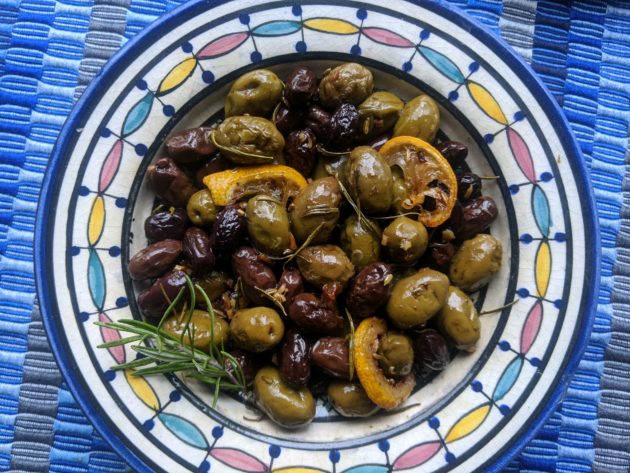
Roasted Spiced Olives
1/2 lemon
3 tablespoons olive oil
2 cloves garlic, minced (about 2 teaspoons)
1/4 teaspoon fennel seeds or cumin seeds
1/4 teaspoon Aleppo pepper or crushed red pepper (optional)
1/4 to 1/2 teaspoon salt, if needed
2-3 sprigs rosemary
3 cups olives, assorted colors and sizes, all with or without pits (about 1 pound)
Preheat oven to 400 degrees.
Wash the lemons very well, then dry it. Cut the lemon in half the long way Slice one of the halves into thin half-moons.
In a medium mixing bowl, stir together the olive oil, garlic, fennel or cumin seeds, pepper and salt, if using. Add the lemons, rosemary and olives and stir to coat everything evenly. Pour the mixture and all the dressing into a baking dish, preferably glass or ceramic, just large enough to hold the olive mixture in one layer. Roast the olives about 25 minutes, until bubbly and the olives start to wrinkle. Stir once halfway through cooking. When the rosemary is cool enough to handle, run your finger down the stems to remove the leaves and scatter over the olives, discarding the stems
Serve warm from the oven or at room temperature with a squeeze of lemon juice or sprinkle of salt, if desired. Cooked olives can be refrigerated up to two weeks. Bring to room temperature before serving or heat briefly in a 350-degree oven.
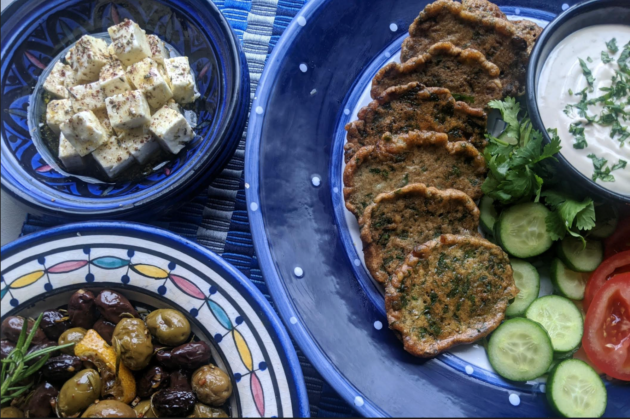
Ejjeh
(Edjeh, Edgeh)
Makes 8-12 patties
6-7 tablespoons scallions, green and white parts, from 5 or 6 scallions
4 tablespoons parsley
4 tablespoons mint, dill and/or cilantro
4 large eggs
1 teaspoon ground allspice
1 teaspoon salt
1/4 teaspoon ground black pepper
1/2 cup chickpea flour*
1/4-1/2 cup olive or good vegetable oil such as grapeseed, safflower or avocado
Options for serving—sliced cucumbers and tomatoes, pickles, pickled vegetables, romaine lettuce leaves; baguette, pita or flatbread
Clean and chop into small pieces the scallions, parsley and other herbs. (Like Persian Jewish food, the cuisine of Syria takes advantage of the abundance of herbs growing there.)
In a large bowl, beat the eggs until they start to get foamy. Add all the ingredients except the flour and olive oil, and combine well. Add the flour and mix until well blended.
Heat about 1/4 cup oil in a large skillet at medium temperature. The oil is ready when a drop of water or batter sizzles in it. For each ejjeh, drop a heaping tablespoon or more of batter into the hot oil, depending on the desired size, then gently even out with the back of the spoon. Fry on each side about 3 to 4 minutes until golden brown. Add more oil as needed. Drain on paper towels or brown paper, or on a rack placed over a baking sheet lined with paper towels or brown paper.
Serve warm or at room temperature, stuffed into chunks of baguette or a pita or wrapped in flatbread, or create a lettuce wrap. Add fresh cucumbers and tomatoes, pickles, pickled vegetables, and drizzle with lemony tahini sauce. The ejjeh can be frozen, separated by parchment or waxed paper and wrapped well. Reheat briefly in a dry pan with a lid or in a 350-degree oven.
*Chickpea flour can sometimes be hard to find, in which case substitute almond flour or all-purpose flour. Not traditional, but still good.
You can make your own flatbread for the ejjeh, as we did in an earlier class. Recipes here.
Lemony Tahini Sauce
It’s so quick and easy to make this sauce that I almost always have some in my fridge to drizzle on vegetables, use as salad dressing and, of course, ejjeh or felafel or even latkes. Leave it thicker with less water to make a sandwich spread or tahini dip for fresh veggies, pita.
1/2 cup tahini (sesame paste)
1 medium or large clove garlic, grated or pressed
1/4 cup fresh lemon juice
1/2 teaspoon salt
5-6 tablespoons cold water
Stir together all the ingredients except the water in a bowl. The mixture will become stiff. Starting with 4 tablespoons, add just enough cold water until the sauce is still thick, but smooth and pourable. If it feels too thin, add a little more tahini. The sauce will keep in the refrigerator up to a week. Stir and thin with a little cold water to reconstitute consistency if necessary.
MARINATED FETA
8 to 10 ounces feta
1 to 2 cloves garlic, sliced thin
1 to 2 tablespoons za’atar
1 tablespoon lemon zest
Olive oil to fill container
Pat the feta dry. With a sharp, straight-edged knife, cut feta into bite-sized cubes. Put a couple garlic pieces, some za’atar and zest in the bottom of a jar or glass container that can hold all the feta. Put about 1/3 to 1/2 of the feta pieces in the container, depending on how deep it is. Add more garlic and za’atar. Repeat once or twice more until As you go, add slices of garlic all around the feta and sprinkle za’atar and lemon zest, saving some for the top and down sides. Fill the container or jar with olive oil, covering all the feta with extra oil on top. Close and refrigerate for at least a day or two. Remove the jar from the fridge before serving so any solidified oil can liquify. Keeps for a few weeks in the refrigerator.
This same technique is a great way to marinate olives, too. As you use the feta or olives, add the oil marinade to salad dressings or drizzle over cooked vegetables, fish or pasta.
ZA’ATAR
(this appears also in the mezze blog post)
Every spice vendor in Israel and throughout the Middle East has their own particular za’atar mix that they become known for. You should do the same and make this mix totally to your taste. Find a blend you like and then use it on pita with olive oil, hummus, babaganoush, labneh, feta, fish, chicken, in salad dressings…you get the idea! I add only a little salt and no cumin or coriander to the mix, preferring to control those ingredients for each recipe using za’atar. This recipe is for the mix I usually––though not always––use.
1 tablespoon dried thyme
2 tablespoons dried marjoram
2 tablespoon dried oregano
2 tablespoons sumac
2 tablespoons sesame seeds, toasted if preferred
½ teaspoon salt
Optional:
1 tablespoon ground cumin
1 tablespoon ground coriander
½ teaspoon Aleppo pepper, more or less depending on the heat desired
Mix together well. Adjust for personal taste. Store in a jar or glass container tightly covered. When you use the za’atar, you can crumble it a bit by hand to release more flavor and aroma.
HAPPY HANUKKAH!
- No Comments
December 4, 2020 by Yona Zeldis McDonough
Saving Leonardo de Vinci’s “Lady with the Ermine”
September 1939 and Edith Becker sits with her hands trembling beneath the table where she’s seated before some of the most important men of the Alte Pinakoteck, one of Munich’s greatest museums. Usually, Edith’s work as a conservator keeps her ] behind the scenes, but today she’s been asked to identify and comment on paintings held in private collections across Poland. What she doesn’t know is that this is just the beginning of an extensive and highly organized plot to plunder Europe’s artwork and use it to glorify the Third Reich.
Fiction Editor Yona Zeldis McDonough talks to Laura Morelli about The Night Portrait, (William Morrow, $16.99) a novel that traces the fraught journey of Leonardo de Vinci’s famous Lady with the Ermine, and how this priceless work of art was ultimately saved.
YZM: How did the idea to write about this aspect of World War II come to you?
- No Comments
 Please wait...
Please wait...